九年级unit8 编号35
人教版九年级英语第八单元Unit8(知识点+习题)
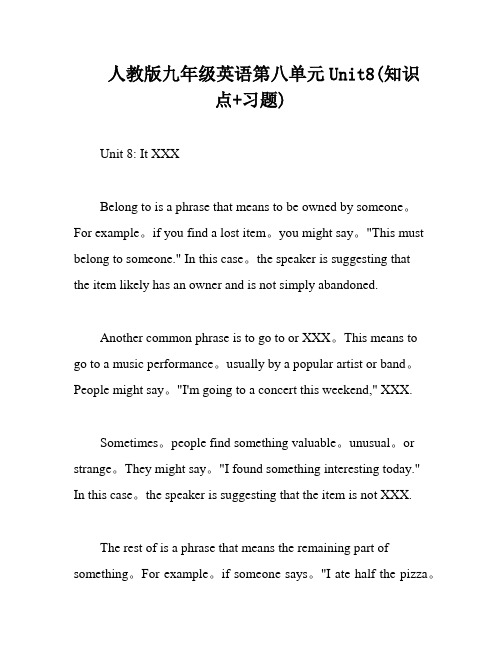
人教版九年级英语第八单元Unit8(知识点+习题)Unit 8: It XXXBelong to is a phrase that means to be owned by someone。
For example。
if you find a lost item。
you might say。
"This must belong to someone." In this case。
the speaker is suggesting thatthe item likely has an owner and is not simply abandoned.Another common phrase is to go to or XXX。
This means togo to a music performance。
usually by a popular artist or band。
People might say。
"I'm going to a concert this weekend," XXX.Sometimes。
people find something valuable。
unusual。
or strange。
They might say。
"I found something interesting today."In this case。
the speaker is suggesting that the item is not XXX.The rest of is a phrase that means the remaining part of something。
For example。
if someone says。
"I ate half the pizza。
and my friend ate the rest of it," they mean that their friend ate the remaining slices.If you pick something up。
Unit8+词汇扩展短语及练习 人教版英语九年级全册

人教版九年级Unit8一、词汇扩展1.valuable. adj.贵重的,很有用的,宝贵的→ . n.价值观,价值,重要→ . v.重视,看中→→ . adj.没有价值的,不值得的2.noise. n.声音,噪音→ . adj.噪音的,吵闹的3.policeman. n.男警察→ . n.男警察们(复数)4.easy. adj.容易的→ . adv容易地→ . adj.担心的,不安的5.outdoors. adv.在户外,在野外→ . adj.户外的,在外面的6.sleep. n/v.睡觉,睡眠→ . adj.睡着的→ . adj.困倦的,困的7.suit. n.西服,套装→ . v.适合,适应→ . adj.合适的二、短语1.belong to… 属于…2. toy truck 玩具卡车3. her favorite writer 她最喜爱的作家4. the only little lid唯一的小孩5. listen to pop music听流行音乐6. hair band 发带7. attend a concert 参加音乐会8. in the music hall 在音乐大厅9. something valuable 贵重的东西10.go to a picnic=go for a picnic去野餐11. at the picnic在野餐时12. the rest of my friends 我其余的朋友13. pick it up 捡起,拾起14. each other=one another 互相,彼此15. nothing much没什么(事)16. something unusual不寻常的东西17. something strange奇怪的事18. anything else其它的东西19. be interviewed by… 被…采访20. strange noises 奇怪的声音基础练习一、单项选择1. ---Isn' t that Ann's husband over there?---No, it _______ be him ------I'm sure he doesn't wear glasses.A. can'tB. must notC. won'tD. may not2. You ______ be tired , you've only been working for an hour.A. must notB. won' tC. can' tD. may not3. He __________ have completed his work; otherwise, he wouldn’t be enjoying himself by the seaside. A. should B. must C. wouldn’t D. can’t4. --Do you know where David is? I couldn’t find him anywhere.—Well . He have gone far------ his coat’s still here.A.shouldn’t B.mustn’t C.can’t D.wouldn’t5. —Tom is never late for work. Why is he absent today? —Something ________ to him.A.must happen B.should have happenedC.could have happened D.must have happened6.—I wonder whether his parents will ________ the parents’ meeting.—Of course they will. They care about their son’s study.A.accept B.arrive C.attend D.appear 7.—What will the weather be like tomorrow?—I’m not sure. It ________ be rainy.A.must B.might C.should8.—I feel ________ today.—That’s because you stayed up late last night.A.sleepy B.ready C.excited9.She taught herself English, because ________ could help her.A.somebody B.anybody C.nobody10.—Is that our math teacher?—It ________ be him. He is much tallerA.must B.should C.might D.can’t二、用所给单词的适当形式填空1.— (who) bike is this? —It's Tom's.2.—Why do you think the man is running? —He (can) be running for exercise.3.—Where's Jane? —I'm not sure. She (may) be in the bedroom.4.It (may) rain later, so take an umbrella with you.5.It (can) be Mr Li. He has gone to America already.6.To win the match, we now need a new (lead) of our team.7.Our new English teacher is kind and full of(energy).8. Our geography teacher told us the Moon (circle) Earth about every 27 days.9.Wearing masks can help (prevent) COVID-19 from spreading.三、根据汉语提示写单词1.People usually (表达) their best wishes on New Year’s Day.2.We should treasure our own (宝贵的)art and culture, such as shadow play and paper cutting.3.He gave me the gesture of (胜利) and I knew he made it.4.It’s too cold outside. There isn’t (任何人) in the park.5.No one can (阻止) him from traveling around the world.6.If you describe something or someone as (发生的事情),you mean that they are exciting or lively ,and involved in the latest fashion or trends . 7.There is a lot of (噪音) in our neighborhood.8.This has made me feel (不安的).9.That means they’re often (瞌睡的)during lessons and may be learning less than they could .10.My mother like to practice Yoga (在户外).四、按要求完成句子1.Lu Xun is Lily's favorite writer.(改为同义句)Lily Lu Xun of all the writers.2.I think she is studying.(对画线部分提问)she is doing?3.Tom thinks Mike is right.(改为同义句)Tom Mike.4.Mr. Wang runs for exercise.(对画线部分提问)Mr. Wang run?5.Light and bright colors make people happier, and they also make people moreactive.(改为同义句)Light and bright colors make people happier more active.。
人教版英语九年级全册单元unit 8 知识点+测试卷+思维导图

Unit 8 It must belong to Carla.1.重点词汇:truck, rabbit, picnic, noise, policeman, wolf, laboratory, coat, suit, circle, leader, purpose, energy, position, victory, enemy, period...2. 短语归纳:1. belong to 属于2. at the picnic 在野餐的时候3. pick up 捡起4. each other 互相5. be interviewed 被采访6. call the policemen 报警7. run away 逃跑8. make noise 制造噪音9. try to do sth 努力做某事10. not only...but also... 不但……而且……11. point out 指出12. stop sb from doing sth 阻止某人做某事13. at work 在上班3. 必背典句:1. -Whose volleyball is this? 这是谁的排球?-It must be Carla’s. She loves volleyball. 一定是卡拉的。
她喜欢排球。
2. -Whose hair band is this? 这是谁的发带?-It could be Mei’s hair band. Or it might belong to Linda. They both have long hair.可能是梅的发带。
或者它可能属于琳达。
他们都有长发。
3. -What did you see that night? 那天晚上你看到了什么?-I’m not sure, but it can’t be a dog. 我不确定,但不可能是狗。
4.语法知识:情态动词must, might, could, can’t的用法1.must表必须,一定。
Unit8 英语人教版九年级全册
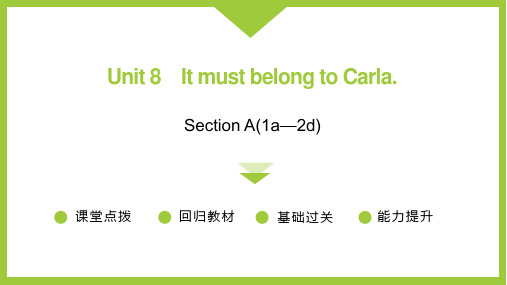
( C )1. A. relative
B. guest
C. fan
D. friend
( D )2. A. smelling
B. worrying C. hiding D. wondering
Unit 8 It must belong to Carla.
返回目录
One day, Pat opened the safe __3__ when his parents were out. To his
( A )6. A. valuable
B. common
C. meaningless
D. educational
( D )7. A. was tired of
B. was afraid of
C. was nervous of
D. was full of
Unit 8 It must belong to Carla.
Unit 8 It must belong to Carla.
返回目录
5. 我们认为昨天晚上罕见的光一定来自不明飞行物。(整句翻译) 【链接单元书面表达核心句式】
__W__e__th_i_n_k__la_s_t_n_i_g_h_t_'s_u_n__u_su__a_l _li_g_h_t_m__u_s_t _b_e_/c_o_m__e_f_r_o_m__t_h_e_U__F_O_.__
①指参加某个组织、团体等,并成为其中的一员。②join sb. 意为“加入某人的行列”。 多指参加小规模的活动,如游戏、娱乐活动等。 指参加群众性活动、会议等,往往指参加者持有积极的态度, 并起一定的作用。
Unit 8 It must belong to Carla.
(新人教版)英语九年级全册:Unit 8 全单元ppt课件(128页)
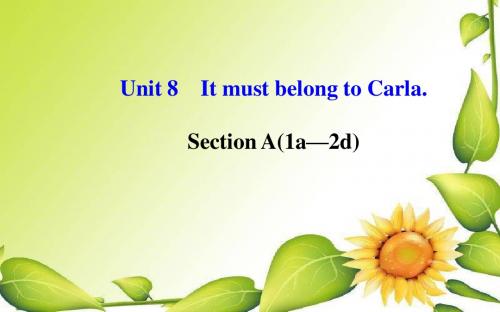
【学以致用】 ①—Excuse me. ______pen is this?
—Sorry, I don’t know. Go and ask Lily.
A. Who B. Whose C. Who’s D. Whom ②Tom’s brother works in a big company. (对画线部分提问) __________ __________ works in a big company? 答案: Whose brother
__________ __________ 3. rabbit 4. attend
5. 粉红色的 (adj. )
__________
6. who (pron. )
7. value (n. )
→____________(所有格)谁的
→____________(adj. )贵重的; 宝贵的 7. valuable
attend
join
指参加会议或群众性活动等, 着重说明句子主语 take part in 参加该项活动并在活动中发挥作用
【温馨提示】take part in是惯用词组, part前一般不用冠词, 但 part前有形容词修饰时, 要用不定冠词。例如: take an active part in积极参加。
2. Whose book is this? 这是谁的书? 【句型剖析】
(1)whose是who的所有格形式, 意为“谁的”, 而who’s是who is
的缩略形式, 意为“谁是”。 (2)whose 在 句 中 可 作 表 语 、 定 语 。 例 如 : Whose is that computer? 那是谁的电脑? (作表语)Whose sweaters are these? 这些是谁的毛衣? (作定语)
人教版九年级英语Unit8全单元课件

Person
Jane’s little brother Mary
Thing volleyball
toy truck
Reason
J.K. Rowling is her favorite writer. She loves volleyball.
Carla
magazine
Deng Wen book
Grace
2b Listen again. Fill in the blanks.
1. The person __m_u_s_t__ go to our school. 2. The person __c_a_n_’t__ be a boy. 3. It _c_o_u_ld___ be Mei’s hair band. 4. The hair band __m_i_g_h_t__ belong to Linda. 5. It __m__u_st__ be Linda’s schoolbag.
Things in the schoolbag 1. T-shirt
2. hair band 3. tennis balls
表示推测的情态动词
表示对某事物的确定程度,即表示推测 的时候,通常会用到以下情态动词: must, might, could, may, can’t, couldn’t
推测可能性: must﹥could﹥might﹥can’t
2. To listen and talk about ownership.
whose adj. & pron. 谁的 who pron. 谁 whom pron. 谁(宾格) e.g. Whose volleyball is this?
It must be Carla’s.
人教版英语九年级全册Unit8SectionA3a3c优秀教学案例

三、教学策略
(一)情景创设
1.为了激发学生的学习兴趣和参与度,我将以环保为主题的情景引入课堂,例如通过播放一段关于环境污染的视频或展示相关的图片,引发学生对环境保护的思考。
2.情景创设还包括将学生带入一个真实的环保场景,例如组织一次校园环保活动,让学生亲身体验环保行动的重要性,从而更加深入地理解课程内容。
1.在总结归纳环节,我会邀请每个小组的代表分享他们的讨论结果和结论,让学生将所学知识和经验进行归纳和总结,加深他们对环保主题的理解和记忆。
2.我会对本节课的重点内容进行简要回顾和总结,强调环保的重要性,并提醒学生将所学知识运用到实际生活中,积极参与环保行动。
(五)作业小结
1.为了巩固所学知识,我会布置相关的作业,如写一篇关于环保的短文、参与一次环保活动等,让学生在实践中运用所学知识,提高他们的实践能力。
(二)问题导向
1.在整个教学过程中,我将设计一系列问题,引导学生主动思考和探索。例如,在阅读文章之前,我会提出问题:“你们认为环保是什么?个人在环保方面可以做些什么?”引导学生思考并激发他们的学习兴趣。
2.问题导向还包括在阅读过程中提出的问题,如“文章中提到了哪些环保措施?它们的有效性如何?”引导学生寻找关键信息并进行分析,提高他们的阅读理解能力。
(一)导入新课
1.课堂开始时,我将以一个引人入胜的环保主题视频或图片吸引学生的注意力,并提出问题:“你们认为环保是什么?个人在环保方面可以做些什么?”让学生思考并激发他们的学习兴趣。
2.为了进一步引入新课,我会邀请一位环保专家或有环保经验的嘉宾进行简短的演讲,分享他们在环保领域的经验和见解,从而引发学生对环保主题的思考和兴趣。
人教版初中初三九年级英语第八单元unit8教材全解加课后练习附答案(8页)备课教案教学设计教学反思导学案

导学案教师: 学生: 年级:日期: 星期: 时段:课题第Unit8 It must belong to Carla考点分析:unit8核心语法之情态动词表示推测的用法学习目标与考点分析情态动词表推测的用法;表达某人的想法与观点学习重点学习方法学习内容与过程课文解读Section BStonehenge ---- Can Anyone Explain Why It Is There?Stonehenge, a rock circle, is not only one of Britain’s most famous historical places but also one of its greatest mysteries. Every year it receives more than 750,000 visitors. People like to go to this place especially in June as they want to see the sun rising on the longest day of the year.For many years, historians believed Stonehenge was a temple where ancient leaders tried to communicate with the gods. However, historian Paul Stoker thinks this can’t be true because Stonehenge was built so many centuries ago. “The leaders arrived in England much later,” he points out.Another popular idea is that Stonehenge might be a kind of calendar. The large stones were put together in a certain way. On midsummer’s morning, the sun shines directly into the center of the stones. Other people believe the stones have a medical purpose. They think the stones can prevent illness and keep people healthy. “As you walk there, you can feel the energy from your feet moving up your body,” said one visitor. No one is sure what Stonehenge was used for, but most agree that the position of the stones must be for a special purpose. Some think it might be a burial place, or a place to honor ancestors. Others think it was built to celebrate a victory over an enemy.Stonehenge was built slowly over a long period of time. Most historians believe it must be almost 5,000 years old. One of the greatest mysteries is how it was built because the stones are so big and heavy. In2001, a group of English volunteers tried to build another Stonehenge, but th ey couldn’t. “We don’t really know who built Stonehenge,” says Paul Stoker. “And perhaps we might never know, but we do know they must have been hardworking ---- and great planners!”要点详解1.Why do you think the man is running?本句由“疑问词+do you think+其他”构成的特殊疑问句。
英语书九年级上册unit8知识点
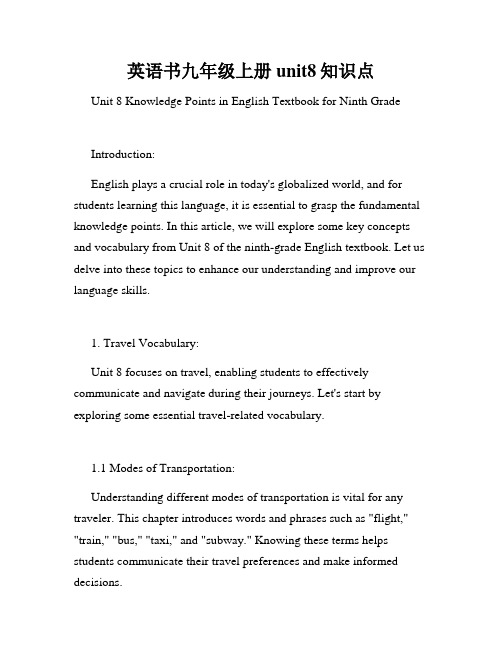
英语书九年级上册unit8知识点Unit 8 Knowledge Points in English Textbook for Ninth GradeIntroduction:English plays a crucial role in today's globalized world, and for students learning this language, it is essential to grasp the fundamental knowledge points. In this article, we will explore some key concepts and vocabulary from Unit 8 of the ninth-grade English textbook. Let us delve into these topics to enhance our understanding and improve our language skills.1. Travel Vocabulary:Unit 8 focuses on travel, enabling students to effectively communicate and navigate during their journeys. Let's start by exploring some essential travel-related vocabulary.1.1 Modes of Transportation:Understanding different modes of transportation is vital for any traveler. This chapter introduces words and phrases such as "flight," "train," "bus," "taxi," and "subway." Knowing these terms helps students communicate their travel preferences and make informed decisions.1.2 Travel Accommodations:In addition to transportation, knowledge of travel accommodation vocabulary is crucial. Terms like "hotel," "motel," "hostel," and "campsite" are taught in this unit. Students learn to discuss their lodging preferences and book appropriate accommodations for their trips.1.3 Sightseeing:When traveling, students may be interested in visiting popular tourist attractions. This unit introduces key words and phrases like "museum," "temple," "monument," and "landmark." By familiarizing themselves with these terms, students can easily plan and discuss their sightseeing activities.2. Adjectives and Comparatives:In Unit 8, students learn to describe various aspects of travel using adjectives and comparatives. This section enhances their ability to express opinions and make comparisons accurately.2.1 Describing Destinations:Students are taught to use adjectives to describe travel destinations. Words such as "beautiful," "breathtaking," "picturesque," and "captivating" enable learners to vividly express their impressions of different places.2.2 Comparing Cities:Through comparative forms, students can compare and contrast different cities. By using structures like "more/less + adjective + than" or "as + adjective + as," students can discuss the similarities and differences between places like Paris and London, Tokyo and New York, or any other combination.3. Travel Idioms:Language learners are always keen to master idiomatic expressions, as they bring depth and nuance to communication. Unit 8 introduces several idioms related to travel, allowing students to broaden their linguistic repertoire.3.1 "Catch a flight/train/bus":This idiom means to successfully board a transportation vessel before it departs. Students will learn related phrases, such as "catch anearly flight" or "catch the last train," which will prove invaluable during their travels.3.2 "Hit the road":This expression means to start a journey. Learning idioms like this helps students add flair to their language and understand colloquial expressions related to travel.4. Grammar: Future Forms and ClausesUnit 8 also explores future forms and clauses, enabling students to express plans and intentions related to travel.4.1 Future Tense:By studying the future tense, students can express their travel plans with accuracy. Understanding structures like "will + base form" and "be going to + base form" provides students with the tools to express their future actions confidently.4.2 Clause Structures:Unit 8 presents students with various clause structures, including "if-clauses" and "time-clauses." These structures allow learners toexpress conditions, possibilities, and timing related to their travel experiences.Conclusion:In Unit 8 of the ninth-grade English textbook, students are introduced to vital travel-related vocabulary, adjectives and comparatives, travel idioms, and future forms and clauses. By mastering these knowledge points, students can effectively communicate, describe their travel experiences, and make future plans. Acquiring these skills not only enhances their English language abilities but also prepares them for real-life situations when they embark on their own journeys.。
人教版新目标英语九年级 Unit8单 元知识点小结

7. at the picnic 在野餐时
差异 / 结果
8. the rest of.... 其余的……
34. add information 添加信息
9. pick it up 捡起,拾起
35. at the same time 同时
10. each other=one another 互相,彼 36. a rock circle 一个石头圈
有…在做某事
庆祝战胜敌人
26. cough a lot 咳得厉害
用法集萃 1. belong to 属于( =be) It must belong to Carla. = It must be Carla's. ※练一练 ① The notebook must be my friend's.(同义句) The notebook must
A. sleep; asleep; sleep B. asleep; sleep; sleepy C. sleep; sleepy; asleep D. sleepy; sleep; asleep 9. ...not only one of Britain's most famous historical places but also one of its greatest mysteries. ⑴not only... but also... 不但……而且…… ⑵either... or... 或者……或者……;要么……要么……;不是……就 是……(两者选择其一) ⑶neither... nor... 既不……也不……(两者都不) ⑷both... and... ……和……(两者)都 这四组连词都可以用来连接两个性质相同的并列成分,作主语、谓 语、宾语或表语等,但⑴⑵⑶在连接句子主语时,谓语动词采取“就近 原则”。both... and... 连接两个主语时,谓语动词通常用使用复数形式。 Neither he or she works here. 他和她都不在这里工作。(主语) You can either come with me or walk home. 你要么跟我一块去,要么走 回家去。(谓语) I have neither time nor money. 我既没时间也没钱。(宾语) He is not only a teacher, but also an actor. 他不仅是一名教师,也是一位 演员。(表语) Either you or I am wrong. 不是你错就是我错。(表语) You may stay either in a hotel or in a private house. 你可以住在饭店或私 人的家里。(地点状语) She was coming back either today or tomorrow. 她不是今天来就是明天 来。(时间状语) ※练一练 ①Both my father and my mother _____(be ) teachers hard. ②-I hear _____ your father _____ your mother likes watching Beijing Opera.
九年级全一册英语unit8知识点
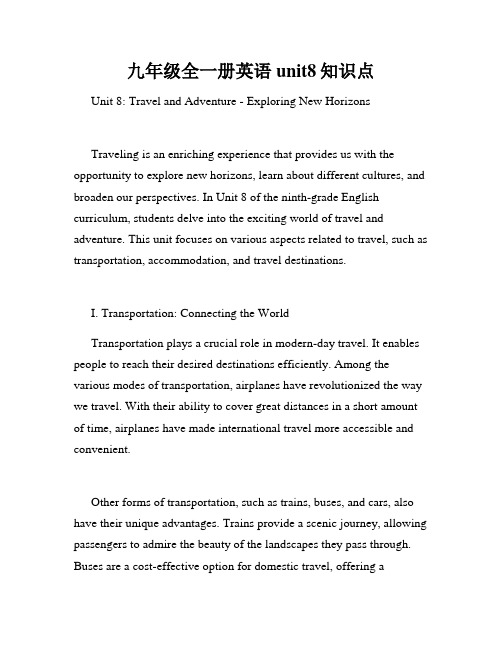
九年级全一册英语unit8知识点Unit 8: Travel and Adventure - Exploring New HorizonsTraveling is an enriching experience that provides us with the opportunity to explore new horizons, learn about different cultures, and broaden our perspectives. In Unit 8 of the ninth-grade English curriculum, students delve into the exciting world of travel and adventure. This unit focuses on various aspects related to travel, such as transportation, accommodation, and travel destinations.I. Transportation: Connecting the WorldTransportation plays a crucial role in modern-day travel. It enables people to reach their desired destinations efficiently. Among the various modes of transportation, airplanes have revolutionized the way we travel. With their ability to cover great distances in a short amount of time, airplanes have made international travel more accessible and convenient.Other forms of transportation, such as trains, buses, and cars, also have their unique advantages. Trains provide a scenic journey, allowing passengers to admire the beauty of the landscapes they pass through. Buses are a cost-effective option for domestic travel, offering acomfortable and affordable way to explore a country. Cars, on the other hand, provide flexibility and freedom, allowing travelers to discover hidden gems and create their own itineraries.II. Accommodation: Finding Comfort Away from HomeChoosing the right accommodation is essential for ensuring a pleasant travel experience. Hotels, hostels, and vacation rentals are popular choices for travelers. Hotels are known for their comfort, amenities, and hospitality. They are available in various categories, catering to different budgets and preferences. Hostels, on the other hand, are a more affordable option, often preferred by backpackers and budget-conscious travelers. Vacation rentals, such as apartments or houses, provide a homely atmosphere and are an excellent choice for families or long-term stays.For those seeking a unique experience, alternative accommodation options have gained popularity in recent years. Camping allows travelers to immerse themselves in nature and disconnect from the hustle and bustle of city life. Additionally, staying with locals through homestays or couchsurfing provides an opportunity to learn about the local customs and traditions firsthand.III. Travel Destinations: Exploring the UnknownThe world is filled with stunning travel destinations, each offering a unique experience. From ancient historical sites to picturesque landscapes, there is something for everyone. Let's explore a few captivating travel destinations.1. The Great Wall of China:Stretching over 13,000 miles, the Great Wall of China is a testament to human ingenuity. This architectural marvel not only offers breathtaking views but also showcases China's rich history. Walking along its ancient paths allows travelers to step back in time and marvel at the engineering prowess of the Chinese civilization.2. The Amalfi Coast, Italy:Famous for its rugged cliffs, colorful coastal towns, and pristine beaches, the Amalfi Coast is a Mediterranean paradise. Travelers can soak in the charm of towns like Positano, Amalfi, and Ravello, while enjoying the region's delicious cuisine and world-renowned limoncello.3. The Serengeti National Park, Tanzania:For wildlife enthusiasts, the Serengeti National Park offers unforgettable safari experiences. Witnessing the annual migration of millions of wildebeest, zebras, and gazelles is a once-in-a-lifetimeopportunity. The park's vast plains, diverse ecosystems, and abundant wildlife make it a must-visit destination for nature lovers.IV. Embracing Cultural Differences: A Journey of UnderstandingTraveling exposes us to different cultures, customs, and traditions. It is an opportunity to learn from others and challenge our preconceived notions. By embracing cultural differences, we can foster understanding and empathy.Engaging with locals, trying traditional cuisine, and participating in cultural activities are ways to immerse oneself in a new culture. These experiences allow us to appreciate the richness and diversity of our world and build bridges of mutual respect.In conclusion, Unit 8 of the ninth-grade English curriculum introduces students to the world of travel and adventure. It covers various aspects of travel, emphasizing the importance of transportation, accommodation, and the exploration of different travel destinations. Through travel, students are encouraged to embrace cultural differences and broaden their horizons. With the knowledge gained in this unit, students can embark on their own journeys, armed with a deeper understanding of the world and its diverse cultures.。
九年级人教版英语unit8知识点

九年级人教版英语unit8知识点Unit 8 Knowledge Points in Grade 9 People's Education EditionIntroduction:English plays a vital role in today's globalized world, and as students, it is crucial to have a strong foundation in the language. In Grade 9, the People's Education Edition textbook presents various knowledge points in Unit 8 that are essential for students to understand and master. Let's delve into the key concepts and skills covered in this unit.1. Vocabulary Expansion:Unit 8 focuses on expanding students' vocabulary related to food, restaurants, and ordering meals. It introduces words such as cuisine, ingredient, appetizer, main course, dessert, etc. Learning these new terms not only enhances language fluency but also enables students to communicate effectively while exploring different cuisines and meal experiences.2. Comparative and Superlative Forms:This unit also emphasizes the use of comparative and superlative forms of adjectives and adverbs. Students will learn the pattern forforming comparatives and superlatives (-er/-est or more/most) and how to use them correctly in sentences to make comparisons. This skill is vital when describing preferences, characteristics, or making comparisons between two or more objects, people, or events.3. Asking and Giving Opinions:Unit 8 covers multiple language functions through lessons on asking and giving opinions. Students will learn phrases and structures to express their preferences and opinions, such as "I think...," "In my opinion...," "I prefer...," "I like...better than...," etc. The ability to articulate personal opinions is essential for effective communication and encourages critical thinking.4. Conditional Sentences:The unit introduces conditional sentences, specifically focusing on the first and second conditionals. Students will understand the structure and usage of conditional sentences and learn how to express real possibilities (first conditional) or hypothetical situations (second conditional) using if-clauses and their corresponding results. This knowledge enables students to discuss future plans, give advice, or speculate about imaginary scenarios.5. Idioms and Phrasal Verbs:Unit 8 offers idiomatic expressions and phrasal verbs that are commonly used in English. Understanding and using these idioms and phrasal verbs not only enhances language proficiency but also adds color and richness to students' spoken and written English. Some examples covered in the unit include "spill the beans," "turn out," "fall for," etc.6. Reading Comprehension Skills:The unit incorporates reading comprehension exercises that develop essential reading skills. Students will practice scanning for specific information, locating main ideas, understanding details, and inferring meanings from context. These skills not only improve students' ability to comprehend written texts but also develop critical thinking and analytical skills.7. Writing: Descriptive Paragraphs:Unit 8 provides opportunities for students to practice descriptive writing. They will learn how to write engaging paragraphs that vividly describe their favorite food, a memorable dining experience, or a specific dish. Through this exercise, students can improve their vocabulary use, sentence structure, and overall cohesion in their writing.Conclusion:Unit 8 in Grade 9 People's Education Edition English textbook offers a comprehensive package of knowledge points that are crucial for students' language development. From vocabulary expansion to grammar structures, from reading comprehension to writing skills, this unit covers a range of essential language skills. By mastering these concepts, students can enhance their overall language proficiency and become confident English users.。
Unit8(单元解读课件)九年级英语全一册(人教版)

0 1 02
03
01 1a-1e 围绕外星人事件进行推测。 02 2a-2e 一篇关于英国巨石阵的说明文。 03 3a-self check 如何写”推测和判断“类文章。
单元重点知识
主题词汇
picnic, belong to, anything valuable , possibly, policeman, noise, happening, uneasy, land ,alien, suit,express,circle, receive,leader,medical,purpose,prevent,energy,position,vic tory,enemy,period.
等自评练习。
核心 句型
It must be... It might/could be ... it can’t be...
技能与策略 学习要点
1.通过以读促写 的写作方式尝试 写作,收集写作 素材; 2.能够利用思维 导图,提纲挈领 塑造作文框架来 进行英语写作, 提升写作能力。。
The world has many mysteries waiting for you to explore.
0 1 02
03 04
01 1a-1c 推测物品是谁的 02 2a-2d 物品遗失。推测书包的主人及对事情发展作合理推测。 03 3a-3b 推测小镇怪声的来源。 04 GF-4c 语法聚焦. 情态动词表推测的用法。
Section B
Section B是探究世界宇宙的奥妙。通过”疑似外星人上街“和” 英国巨石阵“教学活动引导学生关注世界的未知,有逻辑的作出 假设和推测。听说结合,突出阅读训练,激发学生勇于探索真相 的意识。
课例展示 第二课时Section A 3a-3b 课例展示
Unit8重点知识人教版九年级英语全册

九年级Unit8重点知识一词形词块拓展①value v. 重视,珍视n. 价值→valuable adj. 贵重的,很有用的,宝贵的②noise n.声音,噪音→noisy adj. 吵闹的③wolf n. 狼→wolves (pl.)狼④happen v. 发生→happening n. 发生的事⑤easy adj. 容易的,安逸的→uneasy adj. 不安的⑥sleep v.&n.睡觉→slept 过去式→slept 过去分词→sleepy adj. 困倦的,困乏的→asleep adj. 睡着的⑦policeman n. 男警察→policemen(复数)⑧express v. 表示,表达→expression n. 表情,表达方式⑨medicine n. 药→medical adj. 医疗的,医学的⑩receive v. 接待,接受,收到→accept v. 接受⑪lead v. 引导→leader n. 领导→led (过去式)→led (过去分词)⑫history n. 历史→historian n. 历史学家→historical adj. 历史的二、重点短语Section Atoy truck 玩具卡车hair band 发带belong to sb. 属于某人attend a concert 听/参加/出席音乐会in the music hall 在音乐厅anything valuable 贵重的东西go to a picnic 去野餐pick up 捡起;学会;接机strange happenings 奇怪的事情outside our window 窗户外面next-door neighbor 隔壁邻居at first 起初,起先feel uneasy 感到心神不安have his or her own ideas 有他/她自己的想法go away 离开make noise 发出噪音have too much fun doing sth. 乐在其中做某事creat fear in the neighborhood 在社区引发恐慌in the laboratory 在实验室里think of taking a shower 考虑淋浴Section Bfeel sleepy 觉得瞌睡run after 追逐,追赶run for exercise 跑步锻炼express a difference 表达区别add information 添加信息one of Britain's most famous historical places 英国最著名的历史古迹之一one of its greatest mysteries 英国最伟大的奥秘之一receive more than 750,000 visitors 接待75万多名游客see the sun rising 看日出on the longest day of the year 在一年中白昼最长的一天ancient leaders 古代首领communicate with 与.....交流point out 指出a kind of calendar 一种日历in a certain way 以某种方式on midsummer's morning 在仲夏的早晨have a medical purpose 有医疗目的shine directly into the center of the stones 直射巨石阵的中央prevent illness 预防疾病keep people healthy 使人们保持健康the position of the stones 石头的位置feel the energy from your feet move up your body 感觉到(一股)能量从你的双脚上升到你的身体里for a special purpose 有某种特殊的目的 a burial place 一个墓地a place to honor ancestors 一个纪念祖先的地方over a long period of time 在很长一段时间内celebrate a victory over an enermy 庆祝打败敌人的胜利 a group of....一群.....prevent sb.(from)doing sth. 阻止某人做某事stop sb.(from)doing sth. 阻止某人做某事keep sb.from doing sth. 阻止某人做某事at the same time 同时,一起wear a suit 穿着西装三.知识点辨析receive与accepthe ___________them happily.②We__________a welcome treat when we paid a visit to our foreign friend’s home and had a good time. 四.重点句子① It must be Carla’s. 它一定是卡拉的。
新课标九年级英语Unit8全单元课件

The person can’t be a boy, …
18
Байду номын сангаас
What’s inside?
There’s a hair band, ...
2021/5/27
It could be Mei’s.
19
What’s inside?
There’s a hair band, ...
2021/5/27
2c Make conversations using the
information in 2a and 2b.
What’s inside?
2021/5/27
There’s a T-shirt, ...
The person must go to…
17
What’s inside?
There’s a hair band, ...
2021/5/27
10
Whose toy truck is this?
It must be Jane’s little brother’s. He was the only little kid at the picnic.
2021/5/27
11
Whose magazine is this?
It must be Deng Wen’s. He loves rabbits.
in the schoolbag.
Things in the schoolbag
1. T-shirt 2. hair band 3. tennis balls
2021/5/27
14
2b Listen again. Fill in the blanks.
2022九年级英语全册Unit8HaveyoureadTreasureIslandyetSectio

4. A: Whenever I try to read this book, I feel sleepy. adj. 困倦的;瞌睡的 B: It can’t _b_e_i_n_t_e_re_s_t_in_g_/_e_x_c_i_ti_n_g_.
他肯定知道答案。 He can’t know the answers. 他肯定不知道答案。
➢ Grammar
2. can / could can表示推测“可能性”时,一般用于否定句或疑问句。can在疑问句中 意思是“会,可能”。 eg:He can’t pick her schoolbag up. 他不可能拿了她的书包。 could 表示某事有可能发生或可能是事实。 eg:Don’t eat it. It could go bad. 不要吃它,可能坏了。
5. A: I hear water running in the bathroom. B: It _c_o_u_ld__b_e___ (could be / must be / can’t be) Carla. She was thinking of taking a shower.
➢ Grammar
The plane could be put off by the storm. 这趟飞机可能会因为暴风雨而 推迟。
➢ Grammar
3. may / might may, might表示推测“可能性”时,意思是“可能”,“也许”。might 不表示过去时态,语气更委婉,可能性更小。may, might表推测时,可 用于否定句,但不用于疑问句。 eg:He may / might not be at home, but I’m not sure.
九年级全册-Unit8
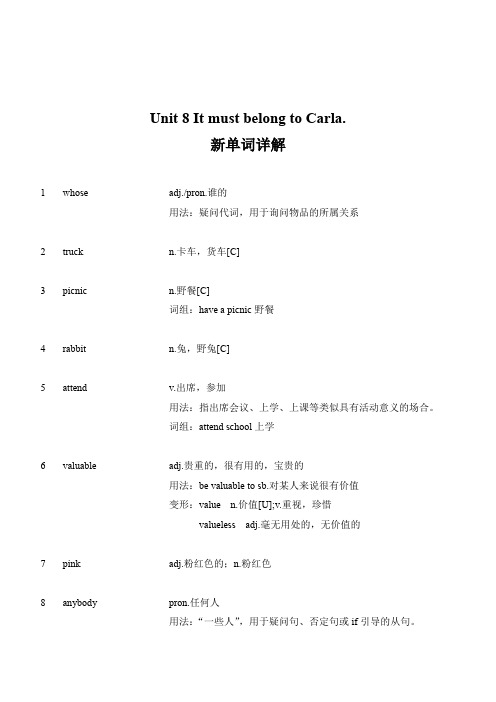
Unit 8 It must belong to Carla.新单词详解1whose adj./pron.谁的用法:疑问代词,用于询问物品的所属关系2truck n.卡车,货车[C]3picnic n.野餐[C]词组:have a picnic野餐4rabbit n.兔,野兔[C]5attend v.出席,参加用法:指出席会议、上学、上课等类似具有活动意义的场合。
词组:attend school上学6valuable adj.贵重的,很有用的,宝贵的用法:be valuable to sb.对某人来说很有价值变形:value n.价值[U];v.重视,珍惜valueless adj.毫无用处的,无价值的7pink adj.粉红色的;n.粉红色8anybody pron.任何人用法:“一些人”,用于疑问句、否定句或if引导的从句。
“任何人”,用于任何句子中,谓语动词用单数。
9happening n.事件;发生的事情(常指不同寻常的)[C]变形:happen v.发生;碰巧sth. happened to sb.某事发生在某人身上sb. happened to do sth.某人碰巧做某事What happened?发生了什么?10noise n.声音[C],噪音[U](一般指人们不愿意听到的声音或嘈杂声)词组:make a noise吵闹noise pollution噪音污染11policeman n.男警察[C]12wolf n.狼[C]13uneasy adj.担心的,不安的变形:easy adj.简单的14laboratory n.实验室[C]15outdoors adv.在户外,在野外词组:go outdoors在户外16coat n.外套,外衣[C]17sleepy adj.困倦的,瞌睡的用法:一般在句中作定语和表语。
作表语的意思是“困乏的”;作前置定语时,意为“寂静的”,如a sleepy street。
- 1、下载文档前请自行甄别文档内容的完整性,平台不提供额外的编辑、内容补充、找答案等附加服务。
- 2、"仅部分预览"的文档,不可在线预览部分如存在完整性等问题,可反馈申请退款(可完整预览的文档不适用该条件!)。
- 3、如文档侵犯您的权益,请联系客服反馈,我们会尽快为您处理(人工客服工作时间:9:00-18:30)。
2015-11-27 九年级英语(上)导学案编号 35 班级_______ 姓名________
主备教师:秦源鼎组审:高存香殷涯倩
课题:Unit 8 It must belong to Carla.
Section A (Grammar Focus)
学习目标:
1.熟练掌握情态动词must, might, could, can’t 用法
2.能够在适当的语境中正确运用must, might, could,
can’t 表推测。
重难点:掌握表推测的情态动词的用法。
课前预习:
一:Read the sentences below
1. --- Whose volleyball is this?
--- It must be Carla’s. She loves volleyball.
2. --- Whose book is this?
--- It must be Mary’s. J.K. Rowling is her favorite writer.
3 .--- Whose hair band is this?
--- It could be Mei’s.
二:Translate the phrases.
outside the window have fun ___________
next-door neighbor _________ at first ______________
run away _____________ feel uneasy ______________
have no idea ____________ have fun (in) doing sth. ______________
课堂导学
一导入
二自主学习Step 1:Read the sentences with the modal verbs underlined.
Step 2:The information about the modal verbs referring to the inference. Step 3:The differences and uses of “can, could”.
Step 4:The differences and uses of “might, may”.
Step 5:The differences and uses of “must, have to”.
Step 6:The different situations about inferring sentences with modal verbs.
Step 7:Complete the sentences with the right words.
Step 8:Activity 4a.Choose the best way to complete each sentence using the words in brackets.
Step 9Activity 4b. Ask Ss to complete these responses
三:合作交流:
1. 表示推测的情态动词:在英语中,表示对某件事物的确定程度,即表示推测的时候,我们通常会用到以下情态动词: _________________________________________________________
2.情态动词表示推测可以分为以下几种情况: (1)情态动词+ do 此结构表示对现在或将来情况的推测和判断
—Do you know where she is now?
—I think she might travel in Beijing. ( 2)情态动词+ be doing 此结构表示对现在或将来正在进行的情况的推测和判断。
At this moment, my father can’t be working in the office. (3)情态动词+ have done
此结构表示对过去情况的推测和判断。
The road is wet. It must have rained last night. (4)情态动词+ have been doing 此结构表示对过去正在进行的情况的推测和判断。
Your mother must have been looking for you at that moment.
课堂小结_______________________________________________________
达标检测
一用所学的情态动词填空
1. In order not to let teachers and parents down, we _____ study hard.
2. You ______ draw on the wall. It’s not good.
3.---____ ( 必须) I do my homework now?---Yes, you _____. ( No, you _______________)
4. Need he go there? Yes, he ____. (No, he ___________________)
5. This book must ________ Carla’s. This book must _________ Carla.
二用所给词的适当形式填空:
1.—________ (who) is this? —It must be Mary’s.
2. The guitar might ________ (belong ) to Alice.
3. What do you think “ anxious” ________( mean)?.
4. She is ________(worry)because of her test.
5. The __________( own) can’t be a boy.
三单项填空。
()1.Mr.Green ________ the meeting and gave a report.
A.attend B.attending
C.attended D.to attend
()2.—________ English book is this?
—Maybe it is Lucy's.
A.Who B.Who
C.When D.Whose
()3.We ________ rubbish in the park to keep it clean.
A.pick up B.get up
C.pick out D.look out
()4.Yesterday something ________ happened.We didn't know what it was.
A.unhappy B.uneasy
C.unable D.unusual
()5.Many things in the museum were ________ last week.
A.steal B.stole
C.stolen D.stealing
()6.It ________ be morning.Listen! The birds are singing.
A.must B.might
C.could D.can't
()7.The reporter was ________ last Monday.
A.interview B.interviewing
C.to interview D.interviewed
()8.The children are having fun ________ on the playground.
A.to play B.play
C.playing D.played
()9.Where ________ did you go during your holiday?
A.other B.others
C.else D.the other
()10.We often see Bob ________ ping-pong in the park.
A.play B.to play
C.playing D.played
()11.This coat ________ be Tom's.He doesn't like the color at all.
A.must B.might
C.could D.can't
()12.—Who broke the glass?
—I don't know.It ________ be the wind.
A.must B.should
C.could D.can't
()13.This book must belong ________ Mike.
A.by B.at C.on D.to
()14.—Whose notebook is this?
—It ________ be Li Ming's.It has his name on it.
A.must B.can't
C.could D.might
课后反思:_______________________________________。
